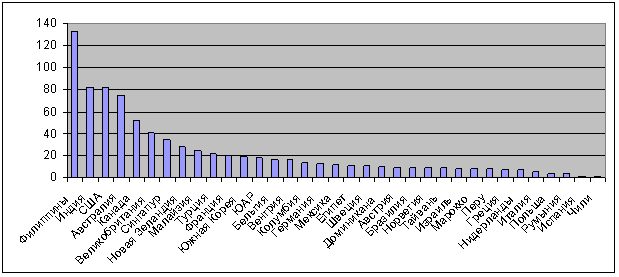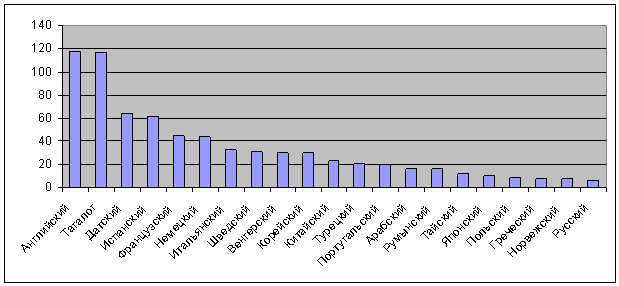Philippine phenomenon
Not so long ago I had to write an essay affecting the education system in the information society .
And I asked myself: in which country is information technology used most intensively for educational purposes? The experience of such a country could be transferred to other countries, including Russia.
To answer this question, I decided to use Google Trends . I tried to enter search queries that people can do only for the purpose of self-education, and then I looked at which residents of the country made the most of these queries. Of course, this method has its drawbacks, but Google, firstly, equates requests made in different languages, and secondly, it has the largest territorial coverage of all.
Having made dozens of such queries, I got a completely unexpected result. The Philippines became the absolute and indisputable leader in such requests. Not Finland, not America, not India, but the Philippines - a country that does not demonstrate a special economic miracle, does not occupy first places in educational ratings, is not particularly rich in IT infrastructure, and does not implement any special educational policy.
Let's see the statistics on the basis of which we can draw conclusions about the existence of educational anomalies.
Here is the distribution of the number of requests by country:

But the distribution by language:

Both territorially and linguistically, the Philippines (and, accordingly, the Tagalog language) lead in the number of educational search queries. Yes, the first place in the linguistic distribution is English, but, firstly, it is the second official language of the Philippines, and secondly, it cannot represent any particular country, due to the large number of English-speaking countries.
Now a little about the methodology and the queries themselves. I tried to make such requests that would meet the following requirements:
What is the reason? I tried to analyze a variety of parameters that could affect these statistics:
Maybe the Philippines' education system is so bad that Filipinos are simply forced to draw their knowledge from the Internet? I have no answer to this question. Maybe, you know?
And I asked myself: in which country is information technology used most intensively for educational purposes? The experience of such a country could be transferred to other countries, including Russia.
To answer this question, I decided to use Google Trends . I tried to enter search queries that people can do only for the purpose of self-education, and then I looked at which residents of the country made the most of these queries. Of course, this method has its drawbacks, but Google, firstly, equates requests made in different languages, and secondly, it has the largest territorial coverage of all.
Having made dozens of such queries, I got a completely unexpected result. The Philippines became the absolute and indisputable leader in such requests. Not Finland, not America, not India, but the Philippines - a country that does not demonstrate a special economic miracle, does not occupy first places in educational ratings, is not particularly rich in IT infrastructure, and does not implement any special educational policy.
Let's see the statistics on the basis of which we can draw conclusions about the existence of educational anomalies.
Here is the distribution of the number of requests by country:

But the distribution by language:

Both territorially and linguistically, the Philippines (and, accordingly, the Tagalog language) lead in the number of educational search queries. Yes, the first place in the linguistic distribution is English, but, firstly, it is the second official language of the Philippines, and secondly, it cannot represent any particular country, due to the large number of English-speaking countries.
Now a little about the methodology and the queries themselves. I tried to make such requests that would meet the following requirements:
- Requests should be explicitly related to education and not related to other areas of human life. For example, the query “Pascal” could characterize a person’s desire to learn about a great scientist, but this query is not suitable due to the great popularity of the programming language of the same name. As a criterion, a search query was entered into Google and the first 10 most popular results were analyzed. If they contained information that was not relevant to the object in question, then such a request was rejected or corrected.
- Requests should concern the most basic, common knowledge that does not go beyond secondary education and is relevant to any country.
- Requests should concern a variety of disciplines, both natural sciences and humanities: mathematics, physics, chemistry, biology, history, philosophy, literature.
- Requests should be formulated as simply as possible in order to maximize the likelihood of an unambiguous translation into all languages of the world.
- democritus
- julius caesar
- amenhotep
- saturn ring
- solar system
- oxidation
- colloid
- hydrogene
- trigonometric formulas
- multiplication table
- blaise pascal
- darwin theory
- human anatomy
- william shakespeare
- tolstoy
What is the reason? I tried to analyze a variety of parameters that could affect these statistics:
- proportion of Internet users of the total population
- average width of the Internet channel
- number of computers per 100 people
- education index
- literacy index
- standard of living
- HDI
- GDP per capita
Maybe the Philippines' education system is so bad that Filipinos are simply forced to draw their knowledge from the Internet? I have no answer to this question. Maybe, you know?
